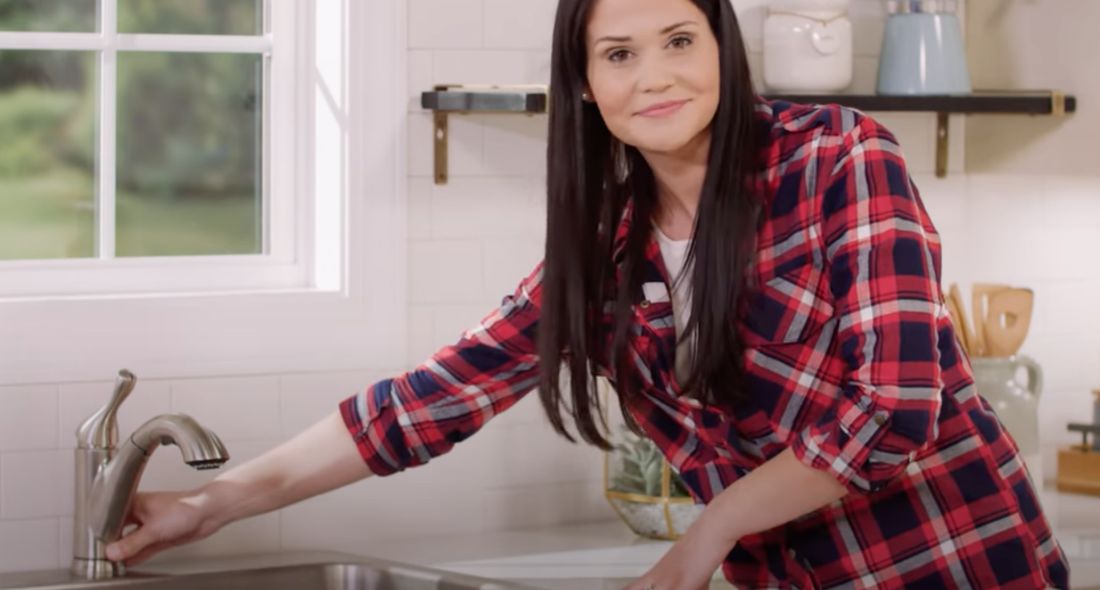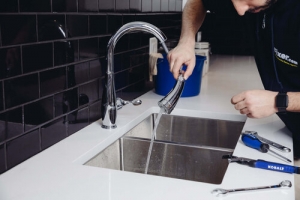Exploring the Importance of Repairing a Leaking Faucet
Exploring the Importance of Repairing a Leaking Faucet
Blog Article
The writer is making several good points about Should I Repair or Replace a Leaky Faucet? overall in the article just below.

Leaking faucets could appear like a minor aggravation, however their impact surpasses simply the inconvenience of the audio. From drainage to incurring unnecessary economic costs and health threats, disregarding a trickling faucet can bring about various consequences. In this post, we'll explore why it's critical to address this common house issue promptly and successfully.
Wastefulness of Water
Environmental Effect
Trickling taps contribute significantly to water wastefulness. According to the Environmental Protection Agency (EPA), a single faucet trickling at one drip per secondly can lose more than 3,000 gallons of water per year. This not just pressures water sources but additionally affects environments and wild animals based on them.
Step-by-Step Overview to Dealing With a Dripping Faucet
Tools Required
Prior to trying to repair a leaking tap, gather the required tools, including a flexible wrench, screwdrivers, replacement parts (such as washers or cartridges), and plumber's tape.
Typical Faucet Issues and Their Solutions
Determine the kind of tap and the specific concern creating the drip. Usual troubles include worn-out washers, corroded valve seats, or defective O-rings. Describe manufacturer guidelines or on-line tutorials for detailed assistance on repair services.
Financial Expenses
Increased Water Expenses
Past the ecological impact, leaking faucets can inflate water bills considerably. The gathered waste gradually equates right into higher utility expenses, which might have been prevented with timely repair services.
Potential Residential Property Damage
Additionally, prolonged trickling can result in harm to fixtures and surfaces bordering the faucet. Water buildup can trigger discoloration, rust, and also structural problems if left neglected, leading to extra repair service prices.
Wellness Issues
Mold And Mildew and Mildew Growth
The constant existence of moisture from a leaking faucet develops an excellent atmosphere for mold and mildew growth. These fungis not only compromise indoor air high quality however additionally pose health and wellness threats, specifically for people with respiratory system problems or allergic reactions.
Waterborne Conditions
Stagnant water in trickling taps can become a breeding place for microorganisms and various other virus, raising the danger of waterborne conditions. Pollutants such as Legionella bacteria thrive in stationary water, possibly causing severe ailments when ingested or inhaled.
Do it yourself vs. Expert Repair
Benefits and drawbacks of Do It Yourself Repair Work
While some may try to deal with a trickling faucet themselves, do it yourself fixings include their very own collection of challenges. Without appropriate understanding and tools, do it yourself efforts can worsen the problem or lead to insufficient repair work, extending the trouble.
Benefits of Employing a Professional Plumber
Working with a specialist plumber guarantees that the underlying reason for the leaking faucet is addressed properly. Plumbings possess the expertise and tools to identify and repair faucet problems effectively, saving time and decreasing the threat of additional damages.
Environmental Responsibility
Specific Contribution to Conservation
Taking responsibility for repairing leaking faucets lines up with wider efforts toward water conservation and ecological sustainability. Every person's activities jointly make a considerable effect on protecting precious sources.
Lasting Living Practices
By prioritizing prompt repairs and taking on water-saving routines, people add to sustainable living techniques that benefit both present and future generations.
Safety nets
Routine Upkeep Tips
To avoid dripping taps, perform regular maintenance such as cleaning up aerators, inspecting for leakages, and changing damaged parts quickly. In addition, consider installing water-saving gadgets or updating to much more reliable fixtures.
Value of Prompt Repairs
Dealing with dripping taps as soon as they're noticed stops more water waste and potential damages, inevitably conserving both water and money in the long run.
Impact on Building Value
Assumption of Well-Maintained Residential Or Commercial Property
Keeping a home in good condition, including attending to maintenance issues like dripping taps, improves its viewed value and desirability amongst prospective buyers or tenants.
Impact on Resale Value
Residences with well-maintained plumbing components, including taps, command higher resale worths in the real estate market. Resolving leaking taps can contribute to a favorable impression during building assessments and arrangements.
Final thought
Resolving a dripping faucet exceeds plain convenience; it's a necessary action towards conserving water, minimizing economic prices, and safeguarding wellness and residential or commercial property. Whether with DIY repair services or expert help, doing something about it to deal with trickling taps is a little yet impactful method to promote responsible stewardship of sources and add to a healthier, much more lasting future.
How to Fix a Leaky Faucet: Step-by-Step Repair Guide
A leaky faucet may seem like a simple annoyance, but if it's not fixed promptly, that leak could cost hundreds to potentially thousands. From water damage to mold, mildew, and high water bills, even a tiny leak can be catastrophic if left unattended. Damage like this can even affect the overall value of your home, so it's important to take the right approach for leaky faucet repair. You may need the help of a plumber in some cases, but we've got a few tips you can try on how to fix a leaky faucet before calling the pros.
Four Faucet Types
When you're learning how to fix a leaky faucet, the first step is knowing what kind of faucet you're working with! There are four common types.
Cartridge Faucets
Cartridge faucets come in one- or two-handled varieties. In one-handled cartridge faucets, hot and cold water combines in a single cartridge. In the two-handled versions, hot and cold water are controlled separately and mixed in the faucet.
Ball Faucets
Ball faucets have a single lever you push up and down to adjust the pressure and rotate to change the temperature. A slotted metal ball controls the amount of water allowed into the spout.
Compression Washer Faucets
They're the oldest type of faucet, but they're still used in many homes — especially older ones. Compression faucets have two separate handles that, when turned, raise or lower the washer that seals a water valve. This valve stops water from flowing through the faucet when it is turned off.
Disc Faucets
Disc faucets rarely need to be repaired due to their maintenance-free design. The water flow is controlled by two discs — the upper one raises and lowers against a fixed lower disc, creating a watertight seal. If your disc faucet starts leaking, you may need to replace the seals or clean residue buildup from the inlets.
Fixing a Leaky Faucet
Step 1: Turn Off the Water
Whether you're learning how to fix a leaky bathtub faucet or how to fix a leaky kitchen faucet, always turn off the water supply to your working area when you're fixing a leak. The last thing you want is a flood added to your list of things to fix.
Look for the shutoff valves below your sink or around the tub and turn them clockwise to stop the water flow. If your faucet doesn't have shutoff valves, you may need to turn off the water for the whole house. Check to make sure it's off by turning the faucet on. If nothing comes out, you're ready to start the repair.
Step 2: Take Apart the Faucet
How you disassemble your faucet depends on the type of fixture you have. You can use a flathead screwdriver to remove the caps on top of the handle or handles for cartridge and compression faucets. Inside, you should see handle screws. Unscrew these with a screwdriver to remove the handle.
Disc- and ball-style faucets will typically have an inlet screw near the handle, and removing that will reveal the interior of the faucet.
Detach the Valve Stem
For cartridge- and compression-style faucets, you'll see the inner valve stem or cartridge once you remove the faucet handles. If you have a compression faucet, unscrew the brass valve stem. If you have a cartridge faucet, pull out the cartridge. If your cartridge has been in place for a while, it may require some tools or extra force to remove it due to mineral deposits.
Examine and Replace Parts
Once you've removed the parts, check them out to confirm what needs to be replaced. You may see corroded rubber washers, O-rings, stems, or cartridges. On a ball-style faucet, check the seats and springs for damage.
If you need to repair a leaky disc faucet, check the inlet and seals on the lower disc.
Once you determine what parts must be replaced, visit your local hardware store. Bring the damaged parts with you to ensure you can purchase the correct components to replace them.
Clean Valves and Faucet Cavity
If you've removed a stem or cartridge, you may notice mineral buildup in the faucet's threads. Use white vinegar to clean the valve seat by soaking it for a few minutes, then scrub it away with a soft toothbrush and rinse with warm water. You can also clean the interior of the faucet in the same way.
Reassemble the Faucet
Once your faucet is cleaned and the required parts have been replaced, it's time to reassemble it. Put the pieces back together and slowly turn the water supply back on. Doing this slowly is crucial because too much initial water pressure can damage the new hardware you've just installed.
https://homewarranty.firstam.com/blog/how-to-fix-leaky-faucet

As an enthusiastic reader on Water Dripping from Faucet: Why and How to Fix, I figured sharing that excerpt was sensible. Liked our write-up? Please share it. Let another person check it out. We love your readership.
Report this page